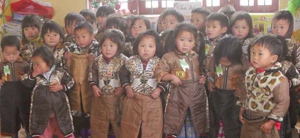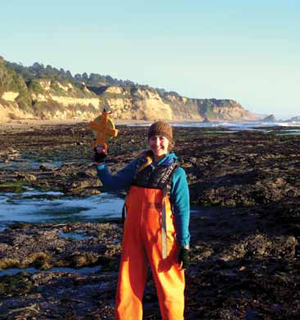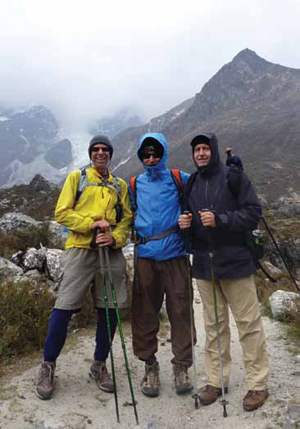As the tiny H'mong pupils tugged on winter pants and coats against the cold that swept into the mountain town of Sapa in North Vietnam, a student in the Tegeruka Secondary School in rural Tanzania flicked on the lights in his classroom.
Though thousands of miles and two cultures apart, the students shared a connection. They were all beneficiaries of a microgrant supplied by a group of UC Santa Cruz alumni who were so inspired by a single class they shared in 1975, they've spent the last 20-plus years funding environmental and social projects around the world.
The men have helped bring hydroelectric power to an isolated village of 50 homes in Bali. They've funded the installation of toilets and drinking fountains at a rural elementary school in Sikkim, India, and supported the education of the first female lawyer from the U'wa tribe in Colombia, whose way of life in the cloud forest is being threatened by oil companies.
So far, the men estimate, they've handed out more than $180,000, most of it in amounts that range from $100 to $2,500, and the majority of it from their own pockets.
They do it out of a social consciousness for what they have and what others need, they say, and also as a way to keep their college friendship alive. It's grassroots philanthropy at its best, drops of kindness that have turned into a stream of good works.
Inspired to act
The Vietnam War had just ended when eight guys walked into a UCSC class titled The Political Economy of Ecological Problems led by a vibrant young professor named Claudia Carr, who now teaches at UC Berkeley.
Carr was what Dean Alper (College Eight '77, environmental studies and humanistic psychology), now a litigation attorney in Marin County, described as a "dynamic dervish of a teacher." Gesturing energetically, filling blackboards with notes, and handing out reading lists that ranged from ecologist Garrett Hardin's "Tragedy of the Commons" to works by free-market economist Milton Friedman, she insisted students not only challenge themselves but also injustice.
"Claudia instilled in us a social conscience," said Skye Leone (Cowell '77, environmental planning), now a senior recreation supervisor for UCSC's Office of Physical Education, Recreation and Sports (OPERS). "She walked her talk. She was a social activist."
It wasn't long before the eight guys in the class—Alper, Leone, Michael Freund, John Razz Cohn, Eric Dazey, Ken Hart, David Paul, and Glen Price—were hanging out.
The men, who all loved the outdoors, scattered after graduation— some of them going to law school, others working as guides or for a nonprofit in Asia—but they stayed in touch. In 1991, they decided to form a foundation as a way to ensure they got together at least once a year. They named themselves Friends Foundation International, and their first grant helped UCSC students build a pond designed to protect the threatened California red-legged frog.
It wasn't long, however, before the group's projects spread beyond Santa Cruz. Their grants began to reach people in Nepal, China, Africa, South America, and Indonesia—20 countries in all.
The amounts were never earthshaking but, the men said, they made sure the grants were life-changing.
"What we didn't want to do was fund studies or office overhead or public relations campaigns," said Alper. "Rather, we wanted to help people who were rolling up their sleeves and doing work in communities and solving real-world problems."
For some projects, that meant starting a ripple of funding that would spread beyond the organization's first small grant. Or, as Leone explained: "It's so they can say to other organizations, 'The Friends Foundation gave us $2,500 and here's what we did— how about giving us $10,000?'"
Other projects were more direct. A medical clinic in Panama received $600 so it could keep its medicines cold. A ranger in Costa Rica got a video camera so he could document poaching activity. Lights flickered on in a remote village in Bali where intrepid farmers raised fish in flooded rice paddies but didn't have money for a hydroelectric system. Clean water arrived at a village in Kenya.
"It's not the great white father swooping in and saying, 'I know the solution,'" Leone said. "It's, 'Here's some money and go do something with it.'"
"What we are very successful at," says Freund (College Eight '77, environmental studies and politics), now an environmental attorney in Berkeley, "is identifying projects in which a small amount of money has a large impact in protecting the environment, helping a village, or protecting public health."
The company of friends
The entire headquarters for Friends Foundation International is contained in a file cabinet in Freund's law office. There are no formal grant applications, no support staff. Instead, projects roll in from group members' travels, from legal connections, or from friends.
Not too long ago, for instance, Julie Kimball, a colleague of Leone's who teaches yoga and swimming for OPERS at UCSC, returned from a trip to Garm, Tajikistan. Considered one of the poorest Central Asia republics, the country lies on the Silk Road, with Afghanistan to the south and China to the east. Many residents of Garm grow their own food, have no indoor plumbing, and struggle to find jobs.
One woman, Rajabalieva Matluba, set out to change things and started building a community/women's center where girls could learn job skills and women could get help protecting their legal rights. As things go in an area where there is unrest, unemployment, and little government help, by the time Kimball arrived, the half-done project had run out of money.
Friends Foundation International sent off $2,500, which was enough to buy the lumber needed to complete the center's second floor. In a letter accompanied by photos of the center, Matluba said 15 girls trained there had recently found jobs.
The men tell stories of treks in Nepal and India, which, among other things, helped inspire them to fund a group in Katmandu called Pro Public, which uses litigation to fight against pollution of land, water, and air. They talk of riding up the remote Cuyabeno River in motorized dugouts to see for themselves the work of a legal group, Corporacion de Defensa de la Vida, which they fund and which is working to help indigenous people in Ecuador's remote Amazon River basin gain legal title to their land and create rainforest reserves in areas affected by oil and mining companies.
They talk about the connections and relationships they've developed around the world. They describe how fulfilling it is to see pictures of solar panels they funded, of little H'mong kids in Vietnam wearing warm clothes.
"The obvious answer to why we do this is because it feels good," Leone said. "But what I didn't expect was the gratitude that people express in receiving this help from strangers halfway around the world. That's what gives me the most satisfaction."
Decades later, the group has diversified, with three women now on the board, including professor Carr. And while the organization recently started holding a once-a-year fundraiser, Friends Foundation is not much different than when it began: a small group of friends, driven by a social conscience to make the world a better place.
"This is the glue that solidifies our connection to each other," Freund said.
Big bang, small bucks
On a cold day along the rocky Central Coast of California, 22-year-old UCSC researcher Sarah Sampson dipped her fingers into the icy water of the Pacific in search of baby mussels.
Her goal was to identify algae and substrates that might attract and support California mussels, a foundational species that helps restore intertidal zones after damage from oil spills.
It was one more example of Friends Foundation International at work—although this project was closer to home.
Inspired by another teacher— the late Richard Cooley, the charismatic founder of UCSC's environmental studies program and a gifted teacher whose work on conservation issues in Alaska has been widely recognized— the men set aside $2,400 in 1996 to start the Richard A. Cooley Memorial Endowment at UCSC.
The endowment, which has since grown to about $46,000, supports field projects like Sampson's, which result in tangible, positive action for the betterment of the environment.
Her work, which not only helped lay the groundwork for more research into intertidal restoration but also fueled her love of field research, was another example of a small action leading to a greater result.
"We live in a place of great privilege, and to do nothing with that is, well, in Claudia's words, 'not acceptable,'" Leone said.
Peggy Townsend is a freelance writer based in Santa Cruz.
This article ran in the spring 2014 issue of UCSC Review.





